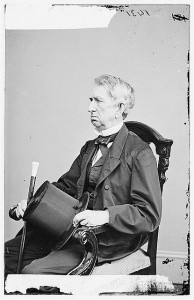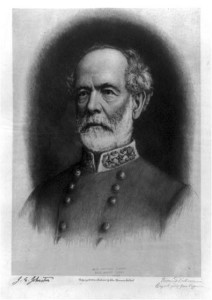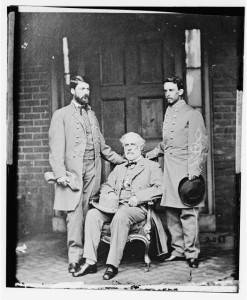Another plucky Monday morning editorial from the Richmond Daily Dispatch on March 27, 1865:
Monday morning…March 27, 1865.
Our sincere condolences are respectfully proffered to Sir Frederick Bruce, the new British Minister to Washington. His predecessor, Lord Lyons, has been literally talked to death by W. H. Seward, in the interminable diplomatic correspondence of the last four years.– …
We are unable to see why the “moral effect” of the fall of Charleston should be greater now than in the first Revolution. …
As to the blockade, we shall, no doubt, suffer considerable inconvenience; but if the Circassian, numbering only three millions of people, could resist Russia, in spite of her blockading fleets, for seventy years, we can hardly be expected to succumb from such a cause during the lifetime of the present generation …
Mr. Lincoln professes, in a late speech, to hail with great delight the employment of negro troops by the Confederacy as the last card of desperation and exhausted resources. What does he think of the employment of them by himself years ago? What was that an indication of? What does the intense eagerness manifested at this moment to enlist negroes in the Federal service mean? –To our minds, it means that the white population of the North will not bear any farther draft for this war, and that the North is practically, for fighting purposes, as much exhausted as the South.
There is every inducement for the Confederate people to show a firm countenance, and a determination to hold out, at least during this campaign. In the first place, the Yankees are themselves as tired of the war as we are. But for the unfortunate withdrawal of Johnston last summer, and the consequent defeat of Hood, which led to the invasion of Tennessee and the dispersion of his army, and the invasion of Georgia by Sherman; but for that one error, the cry for peace at the North would have been stronger than it ever has been here. Indeed, it had already commenced, under the influence of Lee’s victories over Grant, and the unparalleled slaughter by which they were attended, when that unfortunate affair occurred, and changed at once the whole current of the Yankee mind.–Intent upon peace on any terms a moment ago, it changed with success, and now nothing less than subjugation would do. That was because subjugation was now believed to be easy. The war is thought there to be almost at an end. They are told so by their newspapers every day, who, at the same time, fail not to represent our affairs in a condition which it requires but little effort, on their part, to render desperate. Let them be convinced that it is not so, and we shall soon see the Yankee mind veer around to peace once more. Mr. Pollard says that the greatest apprehension expressed by them was that we would persevere. That was the fear of everybody, and expressed in all companies. It was so dreadful because it implied a continuance of war, and they are sick of it to death.
Another reason why we should continue the war is, that a year cannot pass without a collision between France and Yankeedom. …
But the most powerful motive of all is to be found in the terms which the enemy offer us. Nothing less than absolute submission will answer their terms. We must lay down our arms, disband our armies, and submit to such terms as they choose to prescribe.–What those terms will be, we are not left to conjecture. They have already passed a law abolishing slavery. They have already passed a law confiscating the entire territory covered by the Confederate States. They have already declared that the States shall, in future, be entitled to no rights greater than those possessed by the counties. They have, in a word, inaugurated for our benefit one of the most stupendous systems of centralized despotism the world ever beheld, and it is to be inaugurated with the proper accompaniments of a general confiscation and an universal spoliation. A Confederate is to own nothing that he can call his own. He is to be judged by Yankee judges and tried by Yankee juries. He is to be the slave of his own negroes and of their Yankee associates. Such a let is offered him as even Katherine or Nicholas never thought of entailing upon the Poles, and such as makes that of the Irish people blessed in the comparison. If these are not motives for fighting on, then there can be none.
Plucky, but an understanding of the dangers of the blockade and Sherman’s army. If they could just hold out for “this campaign” or for another year. Some people saw that it would be impossible for the Confederate capital to hold out at all. In a letter[1] to his girlfriend 150 years ago today Walter Taylor, Lee’s Adjutant, believed that the evacuation of Richmond was imminent and complained that the government was not preparing itself or its citizens for the “foregone conclusion.”
Edge Hill
27 March 1865
[Colonel Taylor is overjoyed that Bettie accepted his marriage proposal] I earnestly hope, my precious, that circumstances may be such as to obviate the necessity for our separation. Matters have not improved since my last letter and I can see no cause for hope now which did not exist then. I regard the contingency we have fearfully anticipated as a foregone conclusion. What annoys me is the apathy, the listlessness which appears to have possessed those who control our affairs. Instead of facing the misfortune bravely and preparing for it in anticipation, with folded hands they lament our difficulties and danger and indulge a maudlin, complaining strain, whining & losing temper and doing all manner of things, save the right ones, whilst the whole country is ignorant of the impending calamity & blindly imposes implicit confidence in the sagacity and determination or pluck of him I am here rasping in such an unbecoming manner in the plural number. [A footnote explains Colonel Taylor is complaining about President Jefferson Davis.] But truly it is enough to make a body mad to see such imbecility – there is no other word for it. Well, as I was saying, the emergency must come. I now see no steps towards moving the several departments of the gov’t; when the pressure is upon us it may become impracticable. In other words, the Sgn Genl’s office may not be removed and necessity may compel our temporary separation. Here, in my chair, I have for some time reflected upon this emergency. I have earnestly, prayerfully considered what course it is right to pursue. [Colonel Taylor wants to get married before the possible evacuation of Richmond and may any day show up and “relentlessly claiming that dearest little hand and all prepared (that means very dusty, with heavy top boots, spurs, armed to the teeth) to make you Mrs T, my own, own little w—.” Trust in God and some family matters.] I say nothing of our fight. “Twas gallantly done as far as it went. Between the battle field & the papers on my return, I was kept very busy. Heaven bless you prays yr devoted
W.
The editor explains that this was Walter Taylor’s last wartime letter.
- [1]Tower, R. Lockwood with John S. Belmont, eds.Lee’s Adjutant: The Wartime Letters of Colonel Walter Herron Taylor, 1862-1865. Columbia: University of South Carolina Press, 1995. Print. page 237-239.↩



